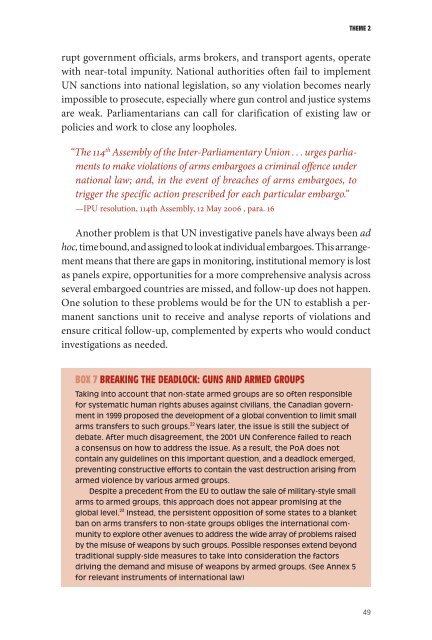MISSING PIECES - Inter-Parliamentary Union
MISSING PIECES - Inter-Parliamentary Union
MISSING PIECES - Inter-Parliamentary Union
Create successful ePaper yourself
Turn your PDF publications into a flip-book with our unique Google optimized e-Paper software.
THEME 2<br />
rupt government officials, arms brokers, and transport agents, operate<br />
with near-total impunity. National authorities often fail to implement<br />
UN sanctions into national legislation, so any violation becomes nearly<br />
impossible to prosecute, especially where gun control and justice systems<br />
are weak. Parliamentarians can call for clarification of existing law or<br />
policies and work to close any loopholes.<br />
“The 114 th Assembly of the <strong>Inter</strong>-<strong>Parliamentary</strong> <strong>Union</strong> . . . urges parliaments<br />
to make violations of arms embargoes a criminal offence under<br />
national law; and, in the event of breaches of arms embargoes, to<br />
trigger the specific action prescribed for each particular embargo.”<br />
—IPU resolution, 114th Assembly, 12 May 2006 , para. 16<br />
Another problem is that UN investigative panels have always been ad<br />
hoc, time bound, and assigned to look at individual embargoes. This arrangement<br />
means that there are gaps in monitoring, institutional memory is lost<br />
as panels expire, opportunities for a more comprehensive analysis across<br />
several embargoed countries are missed, and follow-up does not happen.<br />
One solution to these problems would be for the UN to establish a permanent<br />
sanctions unit to receive and analyse reports of violations and<br />
ensure critical follow-up, complemented by experts who would conduct<br />
investigations as needed.<br />
BOX 7 BREAKING THE DEADLOCK: GUNS AND ARMED GROUPS<br />
Taking into account that non-state armed groups are so often responsible<br />
for systematic human rights abuses against civilians, the Canadian government<br />
in 1999 proposed the development of a global convention to limit small<br />
arms transfers to such groups. 22 Years later, the issue is still the subject of<br />
debate. After much disagreement, the 2001 UN Conference failed to reach<br />
a consensus on how to address the issue. As a result, the PoA does not<br />
contain any guidelines on this important question, and a deadlock emerged,<br />
preventing constructive efforts to contain the vast destruction arising from<br />
armed violence by various armed groups.<br />
Despite a precedent from the EU to outlaw the sale of military-style small<br />
arms to armed groups, this approach does not appear promising at the<br />
global level. 23 Instead, the persistent opposition of some states to a blanket<br />
ban on arms transfers to non-state groups obliges the international community<br />
to explore other avenues to address the wide array of problems raised<br />
by the misuse of weapons by such groups. Possible responses extend beyond<br />
traditional supply-side measures to take into consideration the factors<br />
driving the demand and misuse of weapons by armed groups. (See Annex 5<br />
for relevant instruments of international law)<br />
49
















